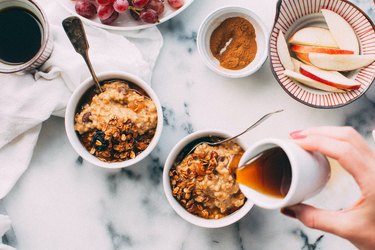
If you've been pining for the perfect power breakfast, look no further than the combo of overnight oats and cold brew.
These two a.m. staples are a perfect match, considering that oats and cold brew deliver a punch of energy thanks to complex carbs and caffeine — just what you need to start your day.
Video of the Day
Video of the Day
How to Make Coffee Overnight Oats
"It's simple to add cold brew or other chilled coffee to your overnight oats. Instead of using all dairy or plant milk as the liquid, replace half of it with cold brew," says Frances Largeman-Roth, RDN and author of Smoothies & Juices: Prevention Healing Kitchen.
"For example, I use one cup of milk and one cup of cold brew to make five servings of overnight oats."
Here's a quick breakdown of how to make overnight oats with cold brew, inspired by Largeman-Roth's recipe:
- Choose the type of oats you'd like to use, such as steel-cut, rolled oats or quick oats.
- Measure 1/2 cup of oats and combine it with your choice of spices and other dry additions, like chia seeds, ground flaxseed and protein powder.
- Combine 1/4 cup of milk and 1/4 cup of cold brew in a measuring cup, and pour the mixture into the container of oats.
- Add other toppings to your overnight oats, such as fresh fruit and chopped nuts. Stir in a natural sweetener, if you like. You can also add some low-fat Greek yogurt and a nut butter of your choice for a dose of protein and healthy fats.
- Cover and refrigerate overnight.
Jazz It Up With Different Flavors
To kick up the flavor, Largeman-Roth likes adding fresh orange zest to the milk she pours over the oats. "For two cups of liquid, I add one teaspoon of zest and throw in orange segments, too. Navel oranges are an excellent source of vitamin C, which is important for immune health," she says.
Some of Largeman-Roth's other favorite flavor boosters are pure vanilla extract and ground cinnamon and nutmeg. "If you want to add a little sweetness to your overnight oats, whisk in a little pure maple syrup, honey or date syrup to the milk. Also, almond or peppermint extract would be fun to add (no more than 1/4 teaspoon, then taste) to your oats."
To avoid a sugar crash, dietitian Nicole Rodriguez, RDN, NASM-CPT, recommends perking up your cold brew with ground cardamom, cinnamon and a dash of vanilla extract for maximum flavor and minimal calories.
The Benefits of Using Cold Brew in Your Oats
Aside from getting your caffeine fix, adding cold brew to your breakfast might be easier on your stomach than enjoying a warm cup of joe.
Hot coffees were found to have higher concentrations of acidic compounds than cold brew, according to an October 2018 study in Scientific Reports, which looked at the acidity and antioxidant levels of hot brew coffee and cold brew made from coffee beans from Brazil, two regions in Ethiopia, Columbia, Myanmar and Mexico.
And because cold brew has fewer acid compounds, it has a less bitter flavor than hot coffee, which makes it more palatable for adding to foods like overnight oats.
"If you're looking for a pick-me-up, it's important to note that temperature isn't the deciding factor," Rodriguez says. "Hot brewing methods actually extract more caffeine, but a dependable cold brew concentrate, such as La Colombe, packs 170 milligrams of caffeine per quarter-cup serving, making it easy to play around with caffeine content based on your needs."
And although the Scientific Reports study found that hot coffee has higher levels of antioxidants, cold coffee still provides some of these beneficial compounds. What's more, an August 2018 cohort study in JAMA Internal Medicine found that coffee drinking has an inverse association with all-cause mortality in people who drank one to eight cups day.
Tip
If you're adding cold brew to your oats, make sure to keep track of your daily caffeine intake. An eight-ounce cup of coffee has about 80 to 100 milligrams of coffee, but the caffeine content in cold brew can vary, per the Food and Drug Administration.
Limit your daily caffeine intake to 400 milligrams, which equals to about four cups of brewed coffee, per the Mayo Clinic. People who are pregnant and breastfeeding or are trying to become pregnant should limit their caffeine to less than 200 milligrams daily.
- Scientific Reports: "Acidity and Antioxidant Activity of Cold Brew Coffee"
- Food and Drug Administration: "Spilling the Beans: How Much Caffeine Is Too Much?"
- Mayo Clinic: "Caffeine: How Much Is Too Much?"
- JAMA Internal Medicine: "Association of Coffee Drinking With Mortality by Genetic Variation in Caffeine Metabolism"
Was this article helpful?
150 Characters Max
0/150
Thank you for sharing!
Thank you for your feedback!